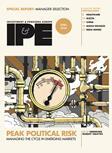Only a few months ago, when the investment community feared the end of the world, cash was king. Since then economic conditions have improved greatly and paved the way for new all-time highs on Wall Street. Although the MSCI World Index has already increased by 15% this year, we are still moderately bullish on equities compared to bonds. Brighter earnings prospects should offset fears of rising interest rates.
For both asset classes, equities and bonds, we prefer the European region, where we see a more favourable risk-reward ratio. Despite the more buoyant outlook, life for the individual funds manager will stay tough. With several potential trouble spots in terms of an economic crisis, a war in the middle of Europe and quickly changing investment themes, volatility will stay high.
As in the past, the major driving force for the global economy will be the US. After outstanding GDP growth of 3.9% last year, we expect a solid 3.2% gain for 1999. Private consumption should be supported by low unemployment, wage increases and capital gains from the stock market (“wealth effect”). The second half of the year should be influenced by a shift in information technology spending. Major investments in IT will be postponed to the first half of next year, when the Y2K problem is solved. Together with a moderation in the housing sector we see the US economy cooling down in the second half of 1999.
Adding all together we believe that the Fed will stay on hold, with the threat of an interest hike keeping the financial markets self-adjusting. In the past couple of months interest rates reacted very quickly to any sign of increasing inflation in the economic data. As long as this mechanism continues to work, the Fed will not stir up international turmoil in the emerging markets with an interest rate increase. For the time being we remain underweight in US bonds.
On the equity side valuations seem stretched. A P/E ratio of 30 for 1999 and 26 for 2000 does not leave room for any disappointments. Although the US equity market does not look cheap by any measure, we keep a neutral weighting. In most of the fast-growing sectors like technology or telecoms, US companies are in a leading position. Taking into account the productivity gains and the willingness of management to react immediately to structural changes makes an underweigt position in US stocks difficult even if they are quite expensive.
During the past two quarters the European equity markets have lagged the US and Japan, with continental Europe performing even worse. Even though the economic perspectives for the Euro-zone are not too bright, with GDP growth expected to come in at 2.1% for 1999, we think that the economic activity will pick up again next year (estimated at 2.9%). On the corporate side we forecast that profits will grow by 11% this year and by 15% in 2000.
Taken on their own as well as compared to bonds, European equities look pretty attractive. Although the potential for further rate cuts by the European Central Bank is limited, the bias compared to the Fed is different. If any step is taken, we expect the Fed in the US to increase rates, while the ECB is more likely to lower again. Under these circumstances the euro will stay under pressure and the spread between US and euro bonds will only stabilise.
Regarding Japan we are not convinced that the recent rally of the Nikkei is supported by sound fundamentals. So far the Japanese “money-for-nothing” policy has not led to a significant improvement. We still believe that there are a lot of economic problems ahead and that Japan has not seen the bottom yet. Political liberation and structural changes are heavily discussed but not realised. We maintain our negative stance towards the Japanese market and see much more potential in the emerging marktes. The emerging markets suffered heavily during the global economic crisis and the companies reorganised their structure simply to survive. Although there is risk involved we prefer a higher degree of emerging market exposure against a neutral weighting in Japan.
Looking at the overall investment style in Europe and the US, the gap between large and small cap stocks has narrowed a little bit. With the sector rotation towards cyclicals, growth stocks suffered from profit-taking while value stocks picked up for the first time in two years. For the coming months this trend should continue, but we regard any major weakness in blue chips as a buying opportunity. Picking the right stocks will not be easy in an environment of quickly changing sectoral themes and an increasing percentage of day trading, but we do not predict a lasting switch from growth to value investing.
Christian Nemeth is asset allocation strategist and senior fund manager at Capital Invest in Vienna












No comments yet